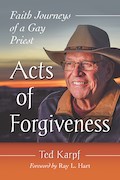Alumni Author Spotlight: Rev. Ted Karpf ’70

Did you know that many Texas Wesleyan alumni are published authors? We love to highlight the successes of our alums and are featuring several TXWES writers over the coming weeks.
While he was student at Texas Wesleyan, Ted Karpf studied religion and journalism and served as the student body president in 1970. He was also an editor of The Rambler and a guardian of the Golden Shears. Check out how he captured his life story in the pages of his book Acts of Forgiveness: Faith Journeys of a Gay Priest.
Tell us about your book.
Acts of Forgiveness tells of my spiritual and faith journeys  from diverse communities to personal solitude, from conventional marriage to gay partnership. Covering the years 1968 to 2018, Acts of Forgiveness contains poetic meditations designed to inform and remind readers that we are neither abandoned nor alone.
from diverse communities to personal solitude, from conventional marriage to gay partnership. Covering the years 1968 to 2018, Acts of Forgiveness contains poetic meditations designed to inform and remind readers that we are neither abandoned nor alone.
What inspired you to write your book?
It was time. I am breaking silence; silence about the past events and demons as well as attempting to clarify the meaning of life and my experience. From writing, I am learning again that a life lived and then reflected upon can reveal many aspects one has not considered before or during an events themselves, and that years and even decades later one’s life can take on a different meanings and values.
What was the writing process like for you?
I write daily, roughly 6-8 hours per day. I have an idea of what I would like to write about, but no specifics as to how it gets there. With Acts of Forgiveness, it felt like taking dictation from my soul. I just sat, placing fingers on the keys and the words emerged. I really didn’t read what I wrote until a chapter was done. Then it was back to clarifying spelling and meanings, missed words and typos. A great experience all around.
What advice would you give to anyone who is considering sharing their story through memoir?
Be yourself and tell your own story. Rarely do we think we have something important or valuable to say about life and experience, faith and understanding until we are prepared to try to write it down. The depth and possibility of meaning often does not occur in the first iteration of a person’s story. It takes a number of tries to liberate meanings. Just keep at until you can say “aha, that’s what it means.”
If you or a fellow alumnus has a published work, contact the alumni office at alumni@txwes.edu to be considered for future feature stories.







